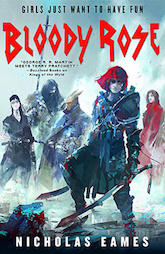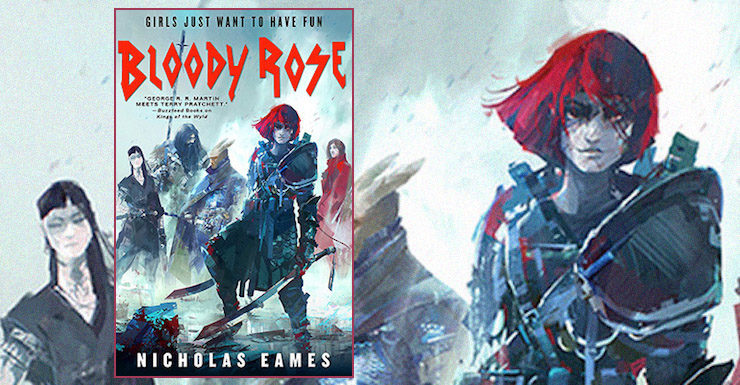“Writing a book as an aspiring author and writing as a published one are,” as Nicholas Eames notes in the acknowledgements of his new novel, “two very different journeys. You think you’ve got the lay of the land, but in fact the map has changed and you’re wandering blind into a territory you thought you’d conquered.” I’d extend Eames’ assertion to the process of reviewing a book, too. Though you’re critical of both, of course, you look one way at a debut—with a willingness to forgive if not forget issues that arise during what is the literary equivalent of an open-mic night—and another at a novel by an established author. Expectations have been created by that stage, so when, for instance, a familiar fault rears its hydra of heads again, you can no longer just look the other way, especially if that author has established himself with a book like Kings of the Wyld, a marvellously metaphorical first novel about a band of mercenaries that wield instruments of war as opposed to song. Now, on the back of “the funniest and finest fantasy debut in ages,” Eames is not the unknown quantity he was before he broke out in early 2017: rather, he’s a real rock star, and happily, that’s a part he plays with appropriate aplomb.
Bloody Rose, the second of the Books of the Band, is a bigger and by some measures better book than its predecessor. I say “some” because, as a sequel of sorts—a standalone set in the same world and featuring some of the same characters—it’s inherently less surprising than said, and like Kings of the Wyld, it’s awfully slow to start. That’s a far harder thing to accept here than it was there—but by all other accounts, Bloody Rose is bloody good fun, and rather beautiful, too.
In the years since the surviving members of Saga gave up the game and settled down following their legendary last tour, another band has taken its place in Grandual’s hard-fought hall of fame. They’re called Fable, and their leader just so happens to be the little girl of the one and only Golden Gabe, the lead swordsman of Saga. Rose isn’t as little as she was when we last saw her, that said, and her famous parent has been the bane of her life since she started her own band.
“Growing up, I wanted more than anything to outshine my father, to be remembered as something other than Gabriel’s Girl. But even after the cyclops, and especially after Castia,” she says, referring to the catastrophe that closed out Kings of the Wyld, “nothing changed. Instead, I’d become the catalyst for my father’s greatest adventure. He was the hero, and I was his happily ever after. Just another damsel in distress. I knew then that if I didn’t do something truly remarkable, then that’s how the world would remember me. If they remembered me at all.”
So it is that Rose sets out to do some truly remarkable things over the course of the coming months, but she doesn’t do any of them alone. These are the Books of the Band, after all, and the other members of Fable are more than mere support; indeed, each has his or her own turn in the limelight. Brune the shapeshifting shaman confronts his father in an arena strewn with the bones of his beleaguered people; Freecloud the rabbit-eared druin had to deal with his own daddy issues when the city of Conthas is attacked; and Cura the inkwitch, who can summon up the creatures she’s turned into tattoos, must come to terms with the trauma that led her down such a dark path.
And then—speaking of dark paths—there’s Rose herself, who’s gone and gotten herself a habit. Before every fight, she swallows Lion’s Leaf to bolster her courage, and “there [are] side effects (addiction not least among them).” Alas, the leaves only give her false courage, and Rose will need real steel if she’s to stand the slightest chance of surviving the hellish events ahead. “A rampaging Horde, a vengeful giant, a ruthless druin sorceress, and her undead Simurg” really might be the least of her problems.
All this we see through the eyes of another—an innocent, even. Tam Hashford is the only daughter of a brute and a bard. As of the outset of the text, she works in a tavern and worships the ground that the bands that tour through her town walk on. Fable is a particular favourite of hers, and she’s always dreamed of a life less ordinary, so when they come to the Cornerstone looking for a new bard, she borrows her boss’s lute and plays her hopeful little heart out.
Her emotionally wrought rendition of “Together,” one of her late mother’s songs, is impressive enough to win her a bed in Fable’s touring turret, but it takes time for Tam to win the trust of her bandmates. During that time she does her duty, which is “to watch, to witness,” and ultimately to turn the exploits of Bloody Rose and her band into songs that will likely outlive them all, but it takes so long for this lot to let the bard into their inner circle that Eames’ second novel seems for several hundred pages to be going nowhere slowly.
What makes this so frustrating is that we’ve been here before. In Kings of the Wyld, the members of Saga had to be dragged kicking and screaming out of retirement before readers saw any real action; in Bloody Rose, any early sense of momentum is similarly stymied by the fact that Tam is positioned on the outside looking in. A grander narrative is waiting in the wings, as it was in the first of the Books of the Band—we’re simply not privy to it, which makes for an opening act that risks foundering without a focus.
I’ll give Eames this, though: Bloody Rose is never boring—not even when you have no idea where it’s going. Its characters are interestingly conflicted from the offing, there’s such an abundance of battles early on that even the author starts skipping them, and Fable spend such a long time on the road that the setting that was so slight in Kings of the Wyld feels much fuller and more fleshed out in its successor. Turns out “there’s a whole wide world out there. It’s messy, and ugly, and strange… but it’s beautiful, too.”
Buy the Book


Bloody Rose
And it is that—as is Bloody Rose as a whole. If Kings of the Wyld was about friendship above all else, then its pseudo-sequel is a funny, fascinating and deeply-felt fantasy about family. It’s interested in the inescapable bonds of blood to begin with, but beyond that those bonds folks forge through choice, and how these choices change them. Take it away, Tam:
Had it been mere months, she pondered, since she’d been a girl infatuated with Fable’s frontwoman? With the whole band, really. She’d considered them heroes, the infallible gods of her own personal pantheon. While on tour, however, and during the hard, harrowing weeks since, she’d come to realise that those heroes were human after all – as fallible as anyone she’d ever met. More so, even.
Freecloud had been made a slave by his devotion to Rose, who in turn was enslaved by her single-minded pursuit of glory for glory’s sake. Cura was marred in myriad ways by a horrific past she’d condemned herself to remembering every time she looked in the mirror. Brune had spent most of his life trying to be something he wasn’t, and had risked his sanity to stake his place in the band.
And yet here they all were: at the cold edge of the world – each of them vying to be worthy of one another, to protect one another, to prove themselves a part of something to which they already, irrevocably belonged.
On the strength of Kings of the Wyld, Nicholas Eames already, irrevocably belonged to the family of fantasy authors whose every book is worth a good, long look, but Bloody Rose guarantees his place at the tavern table. Like the tune Tam plays to become Fable’s bard, it starts softly, uncertainly even—it’s more of a ballad, in that regard, than an anthem—but banishes all but the barest memory of its iffy beginning as it builds and build and builds towards a truly epic ending that will leave Bloody Rose’s readers as thrilled as the rowdy crowds at the Cornerstone.
Bloody Rose is available from Orbit.
Niall Alexander is an extra-curricular English teacher who reads and writes about all things weird and wonderful for The Speculative Scotsman, Strange Horizons, and Tor.com. He lives with about a bazillion books, his better half and a certain sleekit wee beastie in the central belt of bonnie Scotland.










